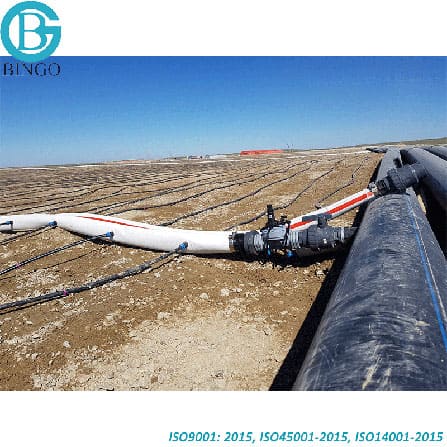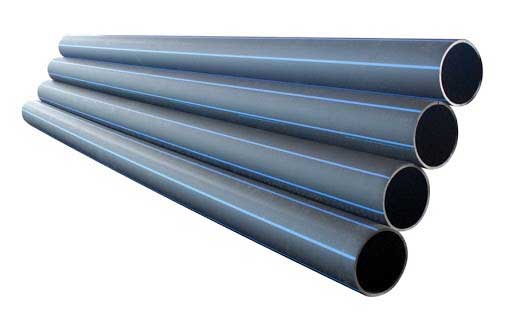How American Plastics HDPE Pipe for Oilfield Supports Oilfield Operations
Understanding the Key Advantages of HDPE Pipe for Water and Wastewater Management
Using HDPE pipeline in water and wastewater management offers many advantages that warrant factor to consider. Its outstanding longevity and long life-span make it a recommended choice for lots of projects. Additionally, the material's resistance to deterioration and chemical damages improves its dependability in various settings. The benefits extend beyond just durability and resistance. American Plastics HDPE Pipe Manufacturing. Exploring its cost-effectiveness and environmental impact exposes much more engaging reasons for its extensive adoption in contemporary facilities
Extraordinary Sturdiness and Longevity

HDPE pipe attracts attention for its phenomenal durability and durability, making it a recommended selection in water administration systems. Constructed from high-density polyethylene, these pipes can stand up to considerable pressure and anxiety, making sure reputable efficiency gradually. Their robust nature allows them to withstand extreme ecological problems, including temperature variations and soil activities, which can trigger various other products to fall short.
The life-span of HDPE pipelines frequently exceeds half a century, supplying a cost-efficient remedy for towns and markets alike. Additionally, the product's lightweight homes simplify installment, minimizing labor expenses and durations. This toughness reduces the demand for frequent repairs or substitutes, better improving its financial appeal.
In water administration applications, the reliability of HDPE pipes suggests fewer disruptions and enhanced solution continuity, making them important to lasting facilities development. The combination of toughness and durability solidifies HDPE's role as a foundation in reliable water management remedies.

Resistance to Rust and Chemical Damages
While many products give in to corrosion and chemical damages with time, HDPE pipelines display exceptional resistance, making them suitable for numerous water administration applications. This strength originates from the molecular structure of high-density polyethylene, which is naturally non-reactive and does not rust like steels or break down from exposure to rough chemicals. Because of this, HDPE is highly effective in settings with aggressive substances, such as wastewater systems that might consist of acids, bases, and organic solvents.
Additionally, HDPE pipes can endure ecological aspects such as dirt level of acidity and saline conditions, even more improving their viability for varied applications (Pipe Manufacturing Midland TX). Their ability to keep architectural honesty with time reduces the danger of leaks and failings, which is critical in ensuring the safety and security and dependability of water circulation and wastewater management systems. Consequently, the resistance to deterioration and chemical damages considerably adds to the overall efficiency and durability of HDPE piping remedies
Cost-Effectiveness and Financial Advantages
When considering the monetary implications of water administration systems, the cost-effectiveness of HDPE pipelines comes to be apparent. These pipelines provide lower setup and upkeep costs compared to conventional materials like steel or concrete. Their light-weight nature streamlines transport and installment, causing minimized labor expenditures. Additionally, HDPE pipes display a long lifespan, commonly exceeding 50 years, which translates to less replacements and long-term cost savings.
The resistance of HDPE to deterioration and chemical damages lessens the need for expensive repairs and substitutes. The pipelines also sustain efficient water flow, minimizing power prices related to pumping systems. By minimizing leakages and water bell reducer loss, HDPE pipelines add to significant economic advantages for districts and industries alike. In general, the first investment in HDPE piping can produce significant economic returns over the lifespan of the water monitoring system, making it a sensible selection for sustainable infrastructure advancement.
Ecological Sustainability and Decreased Impact

Versatility and Flexibility in Installment
As a result of their one-of-a-kind homes, HDPE pipelines offer impressive adaptability and versatility in setup, making them appropriate for a variety of applications. Their light-weight nature enables simpler handling and transportation, decreasing labor costs and installation time. HDPE pipelines can be bent and shaped to fit various terrains and project needs, which is specifically helpful in challenging environments.
Furthermore, their resistance to deterioration and chemical damages enables for installment in varied setups without the need for specialized protective finishings. The capability to fuse joints produces a continual, leak-free system, boosting the general integrity and dependability of the installment. HDPE's adaptability also accommodates ground movement, minimizing the danger of damages in areas prone to moving dirt. On the whole, these attributes make HDPE pipes not only versatile but additionally a Extra resources preferred choice for water and wastewater management systems.
Frequently Asked Inquiries
How Does HDPE Pipeline Compare to PVC in Water Administration Applications?
HDPE pipeline offers superior versatility, resistance to rust, and sturdiness compared to PVC. Its lighter weight facilitates less complicated setup, while its lengthy lifespan lowers substitute costs, making HDPE a recommended choice in water monitoring applications.
What Is the Life-span of HDPE Water Lines Under Regular Problems?
Under normal conditions, HDPE pipelines can have a lifespan varying from 50 to 100 years. Their longevity and resistance to rust add to their lasting efficiency in different applications, making them a dependable choice for facilities.
Are HDPE Pipeline Recyclable After Their Life Span?
Yes, HDPE pipes are recyclable after their life span. Texas hdpe pipe manufacturer. They can be processed and repurposed into brand-new items, substantially minimizing ecological impact and promoting sustainability within the market, making them a green choice for piping solutions
What Is the Installment Refine for HDPE Piping?
The installment procedure for HDPE pipes entails website prep work, trenching, pipe combination or mechanical joining, backfilling, and stress screening. Appropriate strategies ensure a resilient and reliable system for carrying water and wastewater efficiently.
Can HDPE Water Lines Be Made Use Of for Both Potable and Non-Potable Water Solutions?
Yes, HDPE pipelines can be made use of for both safe and clean and non-potable water supply. Their convenience, resilience, and resistance to deterioration make them ideal for different applications, making certain risk-free and effective transportation of water in various contexts.